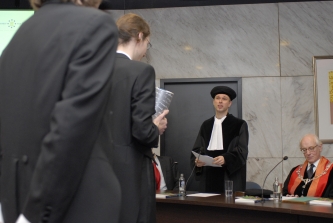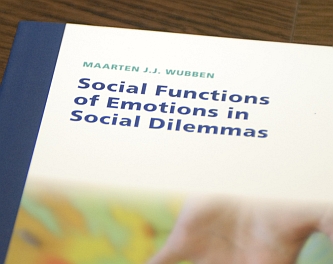Cum Laude PhD Defense Maarten Wubben: “If you scratch my back, I’ll scratch yours”
 Is it really 'unprofessional' or 'unproductive' to express emotions on the workfloor or in the office? This is the key question Maarten Wubben studied in his PhD dissertation <link erim events _blank>Social Functions of Emotions in Social Dilemmas. His main conclusion is that, contrary to popular belief, actually showing emotions often helps employees to cooperate more and achieve better team results.
Is it really 'unprofessional' or 'unproductive' to express emotions on the workfloor or in the office? This is the key question Maarten Wubben studied in his PhD dissertation <link erim events _blank>Social Functions of Emotions in Social Dilemmas. His main conclusion is that, contrary to popular belief, actually showing emotions often helps employees to cooperate more and achieve better team results.
Relationships in organisations are often based on reciprocity: something like “I scratch your back and you scratch mine”. One important finding in this thesis is that emotions do influence such relationships. When a co-worker fails to return a favor, it is advisable to actually express your disappointment instead of masking it. Directly expressing anger, however, may backfire and lead the co-worker to cooperate even less.
Talking and expressing emotions about absent co-workers can be called gossiping, but it actually increases cooperation. When you feel angry or disappointed because a co-worker refuses to help others and you also express this to colleagues, they may actually perceive this as moral or just. They will often react supportively when you refuse to help the uncooperative colleague or they will refuse to help this colleague themselves in an attempt to get this person to cooperate again.
Emotions also affect cooperation in team tasks, especially when they are expressed by influential group members. When such group members communicate anger, for example, people would prefer to install a democratic leader so that cooperation can be ensured. No such measures are preferred when a fellow group member expresses guilt about his or her low contributions to a team project. In fact, guilty group members are expected to cooperate more in the future and the other group members are also perceived as willing to cooperate. People thus expect that everybody in the group will be cooperative and they therefore lead by example—even in projects that would otherwise be too ambitious.
 Maarten Wubben has defended his thesis Cum Laude on February 5. His promoters are <link people david-de-cremer _blank>Prof.dr. D. De Cremer, Professor of Behavourial Ethics at RSM, and Prof.dr. E. van Dijk, Professor of Social Psychology, University of Leiden. Other members of the doctoral committee are Prof. dr. D.L. van Knippenberg, Prof.dr. S.P. Kaptein and Prof.dr. P.A.M. van Lange.
Maarten Wubben has defended his thesis Cum Laude on February 5. His promoters are <link people david-de-cremer _blank>Prof.dr. D. De Cremer, Professor of Behavourial Ethics at RSM, and Prof.dr. E. van Dijk, Professor of Social Psychology, University of Leiden. Other members of the doctoral committee are Prof. dr. D.L. van Knippenberg, Prof.dr. S.P. Kaptein and Prof.dr. P.A.M. van Lange.
About Maarten Wubben
Maarten Johannes Jacobus Wubben was born on May 22, 1983 in Tilburg, the Netherlands and grew up in the nearby village of Berkel-Enschot. Having received his secondary education diploma in 2001 at the St.-Odulphus Lyceum, he started studying psychology in Nijmegen. In 2005, after having completed his thesis on social dilemmas under supervision of Roos Vonk and Jaap Ouwerkerk, he received a Master’s degree in Social Psychology. The research that is reported in this dissertation was supervised by David De Cremer and Eric van Dijk, and conducted at Tilburg University from September 2005 to December 2008 and at the Rotterdam School of Management from December 2008 to September 2009. Maarten currently also works there as a postdoctoral researcher and member of the Erasmus Centre of Behavioural Ethics.
Abstract of the dissertation
Social dilemmas, or situations in which individual and collective interests collide, elicit strong emotions. But are these emotions socially functional in that they help establish cooperation? Generally, they are, as four empirical chapters showed. In dyadic relations, refusal to return a favour is best reciprocated while expressing disappointment instead of anger or no emotion. This does not even lead to a negative impression. When not recipients but observers can reciprocate cooperative acts, non-cooperation out of anger or disappointment is perceived by observers as a just action to retaliate against defectors and is therefore met cooperatively. In situations where group members have to coordinate their contributions to obtain a public good, anger signals bleaker prospects than guilt does, especially when communicated by an influential fellow group member. This makes that group members are more likely to exit the group or install a democratic leader. Guilt actually promotes successful coordination by signalling that both the person that experiences guilt and the person towards guilt is experienced will contribute, which encourages people to cooperate even when coordination is difficult. Thus, emotions are indispensable, socially informative cues that typically help to establish cooperation, facilitate coordination and implement structural solutions in social dilemmas.
More Information
Pictures of the Event
Full Text of the Dissertation

